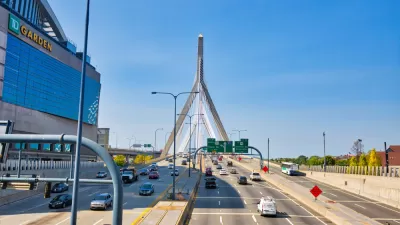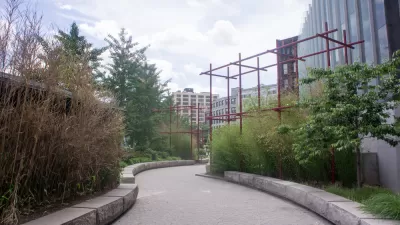Completed years ago, the true cost of Boston's "Big Dig" is finally being tallied. Unfortunately, for residents of Massachusetts, the tab is far from paid, imperiling funding for other necessary transportation projects, reports Eric Moskowitz.
At a legislative committee hearing held earlier this week, Dana Levenson, chief financial officer for the Massachusetts Department of Transportation, delivered the sobering tally of the full cost of the project that buried Interstate 93 through downtown Boston. With the total cost of the project and associated public transit improvements exceeding $24 billion, with interest, the state still owes $9.3 billion in principal and interest on the Big Dig and the completed transit commitments, reports Moskowitz.
The project, and the money still owed, continues to have a significant impact on Massachusetts's finances, "limiting the state's ability to pay for other transportation
infrastructure projects and even day-to-day highway and transit
operation by gobbling up so much money for debt," writes Moskowitz.
While officials were quick to praise the overall successes of the project, its notoriously spiraling costs continue to plague the state. "It is extremely important that we understand the effect that the Big
Dig debt service has on overall transportation spending in
Massachusetts," said Representative David P. Linsky, committee chairman
and a Natick Democrat. "We're paying over $100 million a year in Big Dig
debt service, and that is obviously $100 million that we can't spend on
other transportation needs."
FULL STORY: True cost of Big Dig exceeds $24 billion with interest, officials determine

Planetizen Federal Action Tracker
A weekly monitor of how Trump’s orders and actions are impacting planners and planning in America.

Map: Where Senate Republicans Want to Sell Your Public Lands
For public land advocates, the Senate Republicans’ proposal to sell millions of acres of public land in the West is “the biggest fight of their careers.”

Restaurant Patios Were a Pandemic Win — Why Were They so Hard to Keep?
Social distancing requirements and changes in travel patterns prompted cities to pilot new uses for street and sidewalk space. Then it got complicated.

Platform Pilsner: Vancouver Transit Agency Releases... a Beer?
TransLink will receive a portion of every sale of the four-pack.

Toronto Weighs Cheaper Transit, Parking Hikes for Major Events
Special event rates would take effect during large festivals, sports games and concerts to ‘discourage driving, manage congestion and free up space for transit.”

Berlin to Consider Car-Free Zone Larger Than Manhattan
The area bound by the 22-mile Ringbahn would still allow 12 uses of a private automobile per year per person, and several other exemptions.
Urban Design for Planners 1: Software Tools
This six-course series explores essential urban design concepts using open source software and equips planners with the tools they need to participate fully in the urban design process.
Planning for Universal Design
Learn the tools for implementing Universal Design in planning regulations.
Heyer Gruel & Associates PA
JM Goldson LLC
Custer County Colorado
City of Camden Redevelopment Agency
City of Astoria
Transportation Research & Education Center (TREC) at Portland State University
Camden Redevelopment Agency
City of Claremont
Municipality of Princeton (NJ)




























